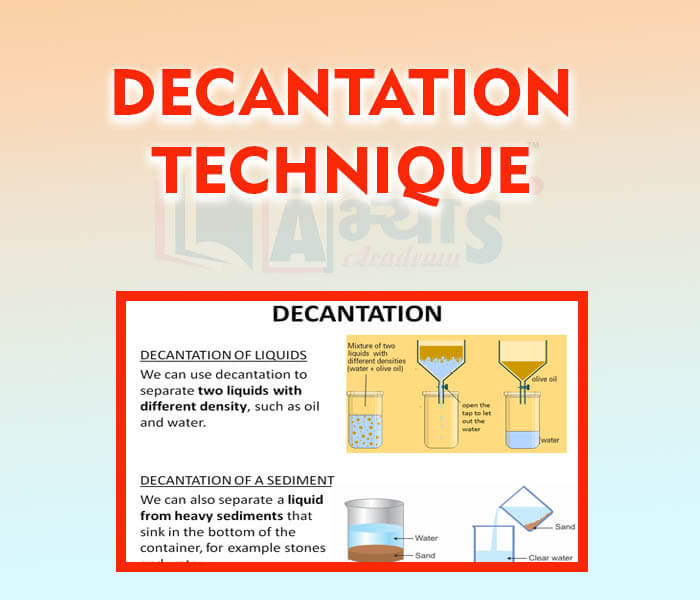Decantation Technique









Decantation Technique
Decantation: The process of pouring out a clear liquid from a vessel (after sedimentation), without disturbing the sediment (heavy, insoluble settled particles) is called decantation. For example; muddy water contains soil and sand in water. Soil and sand being insoluble in water, will settle down at bottom if water is allowed to stand for some time. This layer is called sediment and the deposition of sand at the bottom is called sedimentation. So, when we pour clear water into another beaker without disturbing the sediment, this is known as decantation.
Example: Mixture of Oil and Water can also be separated by the process of sedimentation and decantation. If a mixture is allowed to stand for some time, they form two separate layers. The component that forms the toplayer can be separated by decantation.
Loading: the process of increasing the rate of sedimentation is called Loading. It is done by adding some chemicals to it. Alum is used for thispurpose. Alum is soluble in water. The particles of alum entangle suspended clay particles and make them heavier. Thus, clay particles settle down rapidly.
If Ram pours the water off after boiling the potatoes, what is this an example of ______________ ? | |||
| Right Option : D | |||
| View Explanation | |||
Alum is used in loading tank in purification of water. The role of alum is to ____________________________ | |||
| Right Option : A | |||
| View Explanation |
The process of increasing the rate of sedimentation is called __________________. | |||
| Right Option : A | |||
| View Explanation | |||
Students / Parents Reviews [10]
About Abhyas metholodology the teachers are very nice and hardworking toward students.The Centre Head Mrs Anu Sethi is also a brilliant teacher.Abhyas has taught me how to overcome problems and has always taken my doubts and suppoeted me.

Shreya Shrivastava
8thIt was a good experience with Abhyas Academy. I even faced problems in starting but slowly and steadily overcomed. Especially reasoning classes helped me a lot.

Cheshta
10thA marvelous experience with Abhyas. I am glad to share that my ward has achieved more than enough at the Ambala ABHYAS centre. Years have passed on and more and more he has gained. May the centre flourish and develop day by day by the grace of God.

Archit Segal
7thBeing a parent, I saw my daughter improvement in her studies by seeing a good result in all day to day compititive exam TMO, NSO, IEO etc and as well as studies. I have got a fruitful result from my daughter.

Prisha Gupta
8thMy experience with Abhyas is very good. I have learnt many things here like vedic maths and reasoning also. Teachers here first take our doubts and then there are assignments to verify our weak points.

Shivam Rana
7thIt has a great methodology. Students here can get analysis to their test quickly.We can learn easily through PPTs and the testing methods are good. We know that where we have to practice

Barkha Arora
10thOne of the best institutes to develope a child interest in studies.Provides SST and English knowledge also unlike other institutes. Teachers are co operative and friendly online tests andPPT develope practical knowledge also.

Aman Kumar Shrivastava
10thMy experience was very good with Abhyas academy. I am studying here from 6th class and I am satisfied by its results in my life. I improved a lot here ahead of school syllabus.

Ayan Ghosh
8thMy experience with Abhyas academy is very good. I did not think that my every subject coming here will be so strong. The main thing is that the online tests had made me learn here more things.

Hiya Gupta
8thAbhyas is a complete education Institute. Here extreme care is taken by teacher with the help of regular exam. Extra classes also conducted by the institute, if the student is weak.
